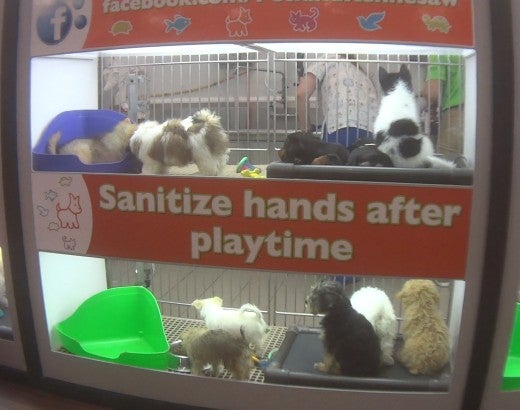The fight to wipe out puppy mills passed a critical milestone this month: more than 350 American localities now ban the sales of puppy mill dogs in pet stores.
The latest ordinances were passed by Roselle, New Jersey; Algonquin, Illinois and Carver, Minnesota last week, taking the total number of such ordinances around the country to 351. This milestone, coming as it does in the midst of a national health crisis, shows how committed lawmakers are to ending puppy mills and to keeping out of their jurisdictions those who profit from animal cruelty.
This is terrific news, and it is a reminder of why it is more important now than ever that we do not stop being vigilant with regards to puppy mills. The coronavirus crisis has created several new concerns about the health and well-being of animals trapped in these enterprises, as we reported last week. Many state legislatures have prematurely ended their sessions or placed them on hold, which means many of our priority bills, including those that cut off puppy mills sales outlets, are also now on hold.
Ongoing closures and shelter-in-place regulations over the coronavirus pandemic could also exacerbate the suffering of pets in puppy mills.
We’ve received reports that some puppy-selling pet stores are not able to remain open during this time because they are in shopping malls that have been closed by state order. We’re reaching out to these malls to make sure there are plans in place to ensure animals trapped in pet stores receive proper care: that staff is allowed inside to care for them and utilities remain on.
We also continue to be concerned with the lack of enforcement of federal and state commercial breeder laws. The USDA this week released talking points concerning coronavirus in the form of frequently asked questions where they claim they will continue to conduct regular Animal Welfare Act inspections, including at puppy mills, in areas where they are allowed. But with a growing number of states asking residents to shelter in place—which would keep the USDA from inspecting facilities—we worry that animals in puppy mills might not even get the substandard care they are now getting.
Also, some pet stores are continuing to sell puppies in a move that appears highly irresponsible at this time given that puppy-selling pet stores have often—and even recently—been implicated by the Centers for Disease Control and Prevention for the spread of campylobacter infection from puppies to humans.
So many Americans are clinging to their pets in these difficult times. Media sources are calling on Americans to rethink our relationship to animals and many of us, homebound and stressed, cherish, more than ever, the value and joy pets bring to our lives. Unfortunately, many animals aren’t so lucky, and we cannot pause fighting for them, not even for a moment.
We have already made great progress in the fight against puppy mills. Three states—California, Maryland and Maine—now have laws that prohibit the sales of puppy mill dogs and kittens in pet stores, despite aggressive attempts by puppy mill interests to defeat them. At a time when good news is scarce, let’s take a moment today to celebrate the new milestone of 351 puppy mill ordinances. These victories are long-fought and hard-won, and we applaud the advocates and local lawmakers who made them happen.



